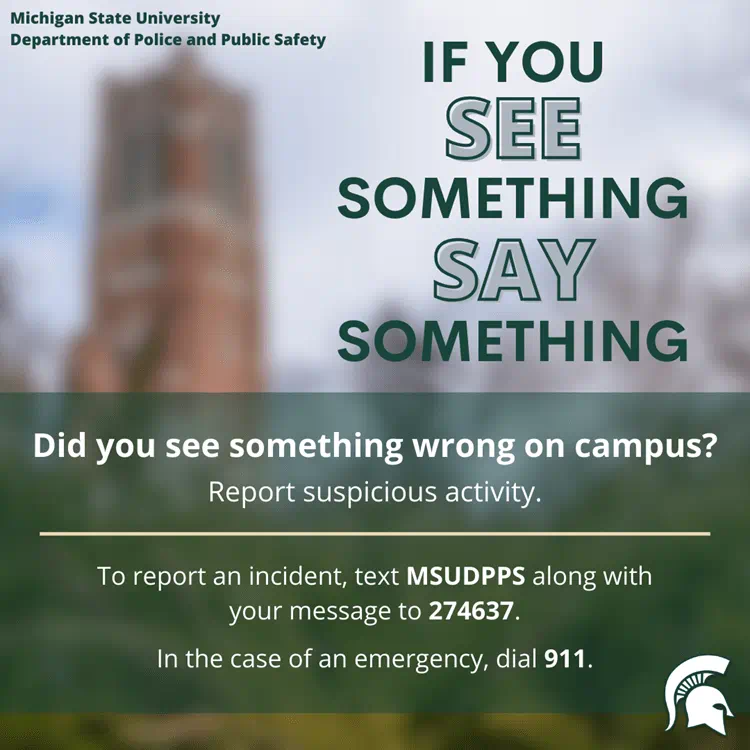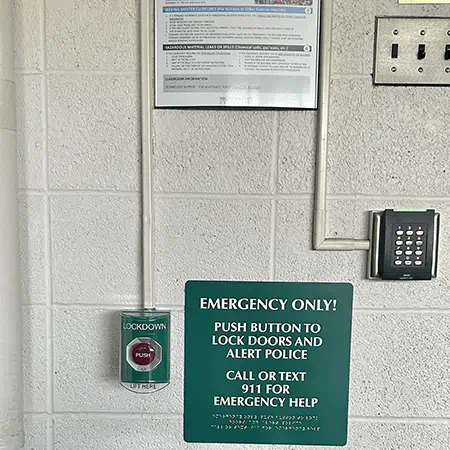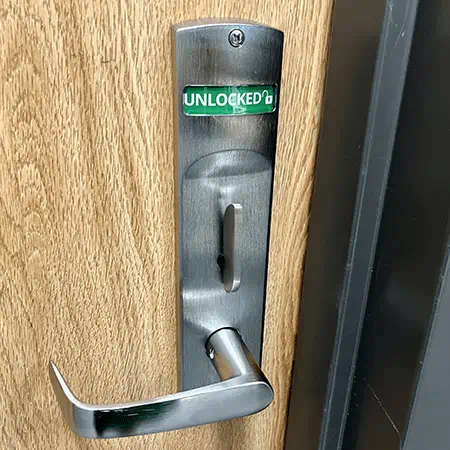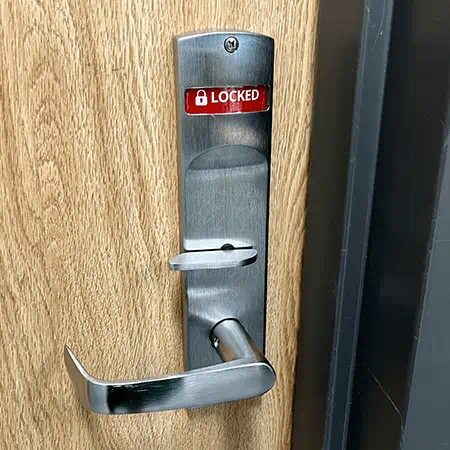
We all play a role in keeping our community safe. If you see something suspicious, report that crime using the contact methods on this website; or by texting MSUDPPS to CRIMES (274637) along with your message. You can also call our tip line at 844-99-MSUPD (844-996-7873).
- Remain vigilant and reduce distractions such as using a cell phone or digital devices
- Familiarize yourself with campus to know the quickest way to get help
- Take extra precaution at night by walking with a friend or group of friends
- Safely dispose expired, unwanted, or unused prescription drugs in the collection bin located in the main lobby of the Michigan State University Department of Police and Public Safety
Evacuation
Evacuation maps are posted at key locations throughout facilities on campus. If an evacuation alarm sounds or if you are ordered to evacuate an area, please keep safety in mind. Move quickly to the nearest exit and move away from the hazard or danger.
There are also emergency classroom guidelines posted in classrooms throughout campus that identify accountability locations, weather shelter protocols, hazardous atmosphere shelter information, and suspicious package guidelines. Please familiarize yourself with exits at facilities you are frequently at.
----
Run/Avoid, Hide/Barricade, Fight/Confront
If an active violence incident occurs, everyone must take primary responsibility for their own personal safety. You should stay aware of your surroundings and minimize and decrease distractions such as cell phones, ear buds, or other items that could reduce your recognition of an incident or threat.
If you receive an MSU Alert or hear the alert tones outside, inform others and take a moment to figure out what is happening. You should also know your options. It is important to mentally and physically rehearse what you would do during an active violence incident to avoid freezing. The Run, Hide, Fight or Avoid, Barricade, Confront models can help you respond.
Run/Avoid
The first thing you should consider doing if an active violence incident is taking place is run, if you can do so safely. If you are not in the immediate vicinity of danger, avoid the area and notify others to do the same. Those physically unable to leave quickly should find a safe location to hide. Remember, seconds matter. Do not grab your personal items or pull a fire alarm, which may cause undue panic and divert first responder resources to the wrong location. Call or text 911 once you are safely away from the danger.
Hide/Barricade
If you are unable to run or avoid the area, you should hide and barricade. Barricade the doors with any items you can find. Improvise in this situation: tie off doors, pile up chairs, tables, bookshelves, or whatever else is in the area. Anything can potentially be used to barricade. Remember to conceal your presence. Lock the doors, draw the blinds, and stay out of sight away from windows and doors.
Fight/Confront
If the suspect enters your area, it is very likely that you will need to defend yourself. A pre-determined survival mindset will help you react quickly, which could help overwhelm the suspect and stop the attack. Commit to your actions. Work with others and use improvised weapons. Anything, such as chairs, fire extinguishers, backpacks, laptops, and scissors, can all be used as a potential weapon.
Active Violence Incident Awareness training for MSU students, faculty, and staff is available on MSU's Ability Training platform. In addition, an Active Violence Incident Awareness training video is available for anyone to watch on MSU DPPS's YouTube channel.
----
Seeking Shelter
Hazardous Materials Outside:
- Close doors and windows in your selected shelter area
- Turn off fans and/or air conditioner
- If possible, have the building heating, ventilation and cooling (HVAC) turned off
- Use plastic sheeting, duct tape, towels, or clothes to seal windows, doors, air vents, etc.
- Notify emergency services of your shelter location and the number of persons sheltered
- Monitor commercial radio/TV for an all-clear notice
- Remain in shelter until notified that conditions are safe to exit
Hazardous Weather:
Sheltering from severe weather is typically thought of for a tornado; however, severe thunderstorms can produce extremely high winds, heavy rains and lightning that can be hazardous or even fatal if precautions are not taken. MSU building Emergency Action Plans have pre-identified Weather Shelter locations that are shaded in yellow on the building’s posted emergency maps.
If you cannot locate a posted map, seek shelter in an area that is as removed from windows as possible. Become familiar with those locations and be prepared to move to shelter if a weather warning is issued.
- Never hold the door open to let strangers into residence halls
- Do not prop any exterior door to residence halls
- Document serial numbers of your valuables
- Do not keep large sums of money, jewelry, or valuables in plain view
More information can be found on the MSU Live On website.
- Never leave your personal property unattended
- Before leaving your residence or vehicle, remember to lock the doors
- Remember to lock your door and windows before going to sleep
- Always lock your bicycle to a bike rack using a U-Lock through the frame and tire
- Use complex passwords that are changed frequently
- Do not open emails or links from untrusted senders
- Do not leave devices unattended
- Only shop online from known companies
- If you think your laptop has been infected with malware, contact police and manufacturer - you may be at risk for identity theft
For more information, visit the MSU SecureIT website.
- Destroy private records and statements
- Never provide your social security number to an untrusted source
- Monitor your credit report
- Review bank and credit card statements
- Research to see if police or security patrol the grounds or buildings
- Ask the leasing office how often the locks are changed
- Check to see if the parking lots are well lit
- Research how safe the commute to campus will be
MSU Infrastructure Planning and Facilities is continuing its work to install hundreds of new door locks for classrooms and teaching lab spaces across campus. These new locks allow those inside the classroom to lock the door while still allowing emergency personnel the ability to enter.
There are two main types of locks being installed across campus in classrooms and teaching labs:
1. Locks engaged with a new lockdown button. Doors with this feature will electronically lock once the button installed near the door is pushed, and emergency personnel will automatically be notified. Doors must be closed for the locking feature to work. With these locks, used mainly in larger auditorium-style classrooms with multiple entrances and exits, signage with directions is being posted next to the button.

2. New lever door handles that are locked by turning a “thumb turn” on the inside of the door.


Regardless of lock type, those inside a classroom or teaching lab will always have the ability to leave the room. Faculty, students and staff should only lock their classrooms and teaching labs during an emergency presenting a threat of active violence. It is not required to keep doors closed and locked at all times. Work on installing new locks will continue into the academic year.
As previously communicated, new locks are not being installed in office spaces, most of which already can be locked with a key or via a toggle on the door edge.
Indoor Safety
- Keep windows closed. Leaving them open, even for a short period of time, can damage pipes and heating systems. Doors and blinds should also stay closed to keep warm air inside.
Outdoor Safety
- Dress warm. Wear layers of loose-fitting, lightweight, warm clothing.
- Always wear a coat, mittens or gloves, and a hat.
- Cover your mouth to protect your lungs from extreme cold.
- Keep an eye out for slippery conditions, both indoors and out.
Travel Safety
- Don't travel if it isn't necessary.
- Carefully plan trips and avoid being outside for extended periods of time.
- Be aware of slippery road conditions and limited visibility. Even after crews have been out, there may still be patches of ice/snow on the roads and sidewalks.
- Drivers and pedestrians should give themselves extra time when traveling throughout campus.
- Pedestrians are encouraged to make eye contact with drivers before entering the roadway and know that it may take vehicles significantly more time to stop in snowy, wet, or icy conditions.
- If on campus, don't park in residence hall loops. MSU Infrastructure Planning and Facilities needs these areas clear for snow plowing.
- Faculty and staff should park university and personal vehicles in parking structures, if possible, to make it easier for surface lots to be cleared of snow.
For more information on winter weather safety, visit ready.gov/winter-ready.